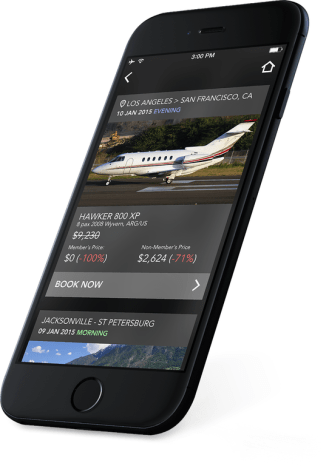JetSmarter, a private air transportation startup, wants to make commuting by private jet a reality for all travelers.
With $20 million in Series B funding from the Saudi Royal Family, music and entertainment moguls including Jay-Z, and executives at companies such as Goldman Sachs and Twitter, the company will take a big step closer to that goal.
Originally launched in 2013 as a booking platform to serve the niche market of wealthy jet-setters, JetSmarter aggregates prices and availability from over 800 private flight providers across the country.
Using the app, travelers can select from over 3,000 airplanes that range from a propeller plane to a Boeing business jet, and book a flight to nearly any city.
“That’s the traditional niche market, the charter customer who pays to create itineraries for themselves,” says founder Sergey Petrossov. “But the price barrier to create your own charter flight is still very high, and it’s only an option for about 250,000 people in the U.S.”
That’s why JetSmarter also offers a membership program to make private jet travel more affordable for frequent fliers. For an annual fee of $9,000 a year, members have total access to the 35,000 hours of private flights that JetSmarter has pre-purchased — at no extra cost.
Members have two options: JetDeals, which are spontaneous last-minute, one-way flights, or JetShuttle, which offers shared, scheduled flights between major cities.
“Essentially it works like an airline, except you go through private carriers,” says Petrossov. “There’s no going through security, you just pull up to a private plane five minutes before you take off and go.”
Paying $800 per month to make unlimited trips across the country, by private jet, sounds absurdly inexpensive. Currently, the majority of the JetShuttle flights range from 1.5 to 3 hours, but Petrossov says that the company is currently working on a better coast-to-coast product.
“We’ve really democratized the private jet space,” says Petrossov. “Today for $800 a month, you can actually start flying on private jets.”
JetSmarter is not the first startup to go after the “Uber for private jet” business. Blackjet, a similar service also backed by Jay-Z, ceased operations in late 2013 due to a lack of capital, but appears to be back up and running. Victor, another private jet charter startup, closed $5 million in new funding earlier this year.
JetSmarter counts thousands of members, and hundreds of thousands of non-member users, who check the app an average of 3.2 times per day.
Petrossov says that all of the investors in this round started as JetSmarter customers, because he wanted brand ambassadors involved in the early stages of the company. He hints at a large institutional fund raise before the year’s end.
“We want to make all air travel private, meaning we’re competing with airlines, not private jet companies,” Petrossov says. “This may be a 20- to 30-year vision, but with more efficient aircraft and proper sharing tools, we can reach that future.”
Source:TechCrunch

